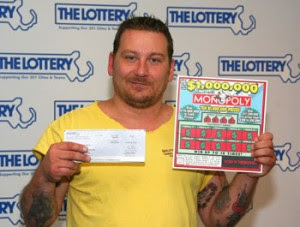Mass Lottery Biography
The Massachusetts Lottery was established in 1971, following the legalization of gambling by the Massachusetts General Court, the legislature of the Commonwealth. The Lottery is administered by a commission of five members, who include the Treasurer and Receiver-General (who serves as chairperson); the Secretary of the Massachusetts Department of Public Safety; and the Comptroller, who serve on an ex officio basis. The Governor appoints the other two members.
The Lottery is unusual in withholding 5 percent on prizes over $600, instead of only over $5,000 (the Federal level.) The withholding on prizes of at least $5,000 is 30 percent.
The Lottery had come under criticism for not offering a cash option for many of its annuitized games. In 2004, then-94-year-old Massachusetts resident Louise Outing sparked controversy after she failed to win a lawsuit to have her $5.4 million Megabucks jackpot prize paid as a lump sum.[1] (Outing died in 2006.) In May 2009, Megabucks was replaced by Megabucks Doubler, which has a cash option; beginning in June 2009, winners of annuity prizes in scratch games, including lifetime payouts, were allowed to receive a lump sum. However, there is no cash option in the New England-wide Lucky for Life, which is an expanded version of a Connecticut game; its drawings remain in Hartford.
In Megabucks Doubler, every 10th ticket is eligible for a doubled non-jackpot prize. The payout percentage in this game is 55%.Cash Winfall was drawn Mondays and Thursdays. Six numbers 1 to 46 were chosen. The jackpot began at $500,000; it always was paid in lump sum. Lower-tier prizes were $4000, $150, or $5 for matching five, four, or three numbers respectively; two numbers won a free Cash Winfall bet. If the jackpot reached $2 million and was not won, the jackpot was "rolled down" with the secondary prizes increased.
The Massachusetts Lottery was established in 1971, following the legalization of gambling by the Massachusetts General Court, the legislature of the Commonwealth. The Lottery is administered by a commission of five members, who include the Treasurer and Receiver-General (who serves as chairperson); the Secretary of the Massachusetts Department of Public Safety; and the Comptroller, who serve on an ex officio basis. The Governor appoints the other two members.
The Lottery is unusual in withholding 5 percent on prizes over $600, instead of only over $5,000 (the Federal level.) The withholding on prizes of at least $5,000 is 30 percent.
The Lottery had come under criticism for not offering a cash option for many of its annuitized games. In 2004, then-94-year-old Massachusetts resident Louise Outing sparked controversy after she failed to win a lawsuit to have her $5.4 million Megabucks jackpot prize paid as a lump sum.[1] (Outing died in 2006.) In May 2009, Megabucks was replaced by Megabucks Doubler, which has a cash option; beginning in June 2009, winners of annuity prizes in scratch games, including lifetime payouts, were allowed to receive a lump sum. However, there is no cash option in the New England-wide Lucky for Life, which is an expanded version of a Connecticut game; its drawings remain in Hartford.
In Megabucks Doubler, every 10th ticket is eligible for a doubled non-jackpot prize. The payout percentage in this game is 55%.Cash Winfall was drawn Mondays and Thursdays. Six numbers 1 to 46 were chosen. The jackpot began at $500,000; it always was paid in lump sum. Lower-tier prizes were $4000, $150, or $5 for matching five, four, or three numbers respectively; two numbers won a free Cash Winfall bet. If the jackpot reached $2 million and was not won, the jackpot was "rolled down" with the secondary prizes increased.
Mass Lottery
Mass Lottery
Mass Lottery
Mass Lottery
Mass Lottery
Mass Lottery
Mass Lottery
Mass Lottery
Mass Lottery
Mass Lottery
Mass Lottery
Mass Lottery
Mass Lottery
Mass Lottery
Mass Lottery
Mass Lottery
Mass Lottery
Mass Lottery
Mass Lottery
Mass Lottery




















No comments:
Post a Comment